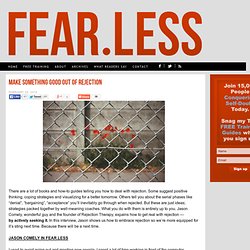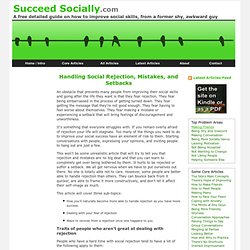

7 Ways to Stop Fearing What Everyone Thinks of You. Email The unhappiest people in this world are the people who care the most about what everyone else thinks.

“What’s wrong with wanting to please others?” That’s what several people asked me via email in response to one of my recent articles. Today, I want to discuss why it’s not healthy to try to please everyone, and how to stop yourself from doing so. Seeking approval from others is perfectly fine up until the point where you are compromising your health and happiness in the process. I literally felt like I was short of breath – almost as if I’d die if my peers didn’t approve of me. The big problem was that, as a twenty-something college graduate entering the work force, I felt that anything I did or even thought only had validity if it was the “right thing” to say and think. 7 Smart Ways to Stop Fearing Rejection. Email When you’re feeling insecure, you typically don’t notice the hundreds of people around you who accept you just the way you are.
All you notice are the few who don’t. In what way is the fear of rejection holding you back? How would your life be different if you didn’t care whether everyone liked you and agreed with you, or not? To answer these questions, we must understand that the vast majority of our fears and anxieties amount to one thing: Loss. 100 Days of Rejection Therapy. How to overcome rejection sensitivity. This is why rejection hurts — and how to cope with it. The science behind rejection.

Source: Supplied I’VE experienced it. You’ve experienced it. Even U2 has experienced it. Yet every time it happens, we’re reminded again how not fun it is to be rejected. Rejection knows no bounds, invading social, romantic and job situations alike. Plus, the more people learn to expect rejection and become concerned about it, the more sensitive they are to it — which can eventually lead to self-rejection, Downey tells HuffPost. Indeed, Guy Winch, Ph.D., a HuffPost blogger, psychologist and author, notes that many times the rejection does 50 per cent of the damage and we do the other 50 per cent of the damage. Make Something Good Out of Rejection. There are a lot of books and how-to guides telling you how to deal with rejection.

Some suggest positive thinking, coping strategies and visualizing for a better tomorrow. Others tell you about the serial phases like “denial”, “bargaining”, “acceptance” you’ll inevitably go through when rejected. But these are just ideas; strategies packed together by well-meaning coaches. What you do with them is entirely up to you. Jason Comely, wonderful guy and the founder of Rejection Therapy, expains how to get real with rejection — by actively seeking it. I used to avoid going out and meeting new people. I did a lot of work alone in my home office. Social networks were a replacement for meeting real people. With some introspection, I realized the reason I was so dependent on the Internet for my social life was that I was afraid of rejection.
They say the easiest way is the hardest way, right? There wasn’t the drama that I had conjured up in my head. Jason-comely Thomas S. So, it’s gradual. Afraid of Rejection? How to Avoid It. Fear holds us back, we all know, but what exactly are we afraid of when we don’t implement that business idea, email that bigwig or approach the attractive stranger across the bar?

The answer to all these questions is the same: we fear rejection. Humans are social animals and the pain of being told no, losing relationships, or having others think we’re foolish is very real, and very limiting. Handling Social Rejection, Mistakes, and Setbacks. An obstacle that prevents many people from improving their social skills and going after the life they want is that they fear rejection.

They fear being embarrassed in the process of getting turned down. They fear getting the message that they're not good enough. They fear having to feel worse about themselves. They fear making a mistake or experiencing a setback that will bring feelings of discouragement and unworthiness. It's something that everyone struggles with. This won't be some unrealistic article that will try to tell you that rejection and mistakes are no big deal and that you can learn to completely get over being bothered by them. This article will cover three sub-topics: 7 Smart Ways to Stop Fearing Rejection. How to Overcome the Fear of Rejection: The Successful Rejection Experience. By Jonathan Robinson, MA, MFT When I was seventeen, I was very shy - especially with attractive women my own age.

By the time I was a freshman in college, I had only been on two dates. Driven by teen-age hormones, I really wanted to meet and go out with some women, but I was terrified of being rejected. My fear was like a prison, keeping me locked away in self-imposed loneliness. One day, I vowed I would overcome my fear. I strolled down to the University Center to seek out attractive women. Michael Neill: What's So Scary About Rejection? Years ago, I hired the author Steve Chandler as my sales coach.

One of the things he really helped me see was how much thinking I had around the concept of "rejection". Here's an analogy he shared that really struck me: Imagine a friend of yours receives an extraordinary offer from an eccentric millionaire. This mysterious benefactor sets a timer for 10 minutes and hands your friend a coin.
Each time your friend flips the coin in the next 10 minutes and it comes up "heads," he will receive $1,000. The timer starts, but to your surprise, your friend doesn't immediately start flipping the coin. Finally, after almost two minutes of deep breathing and intense concentration, your friend flips the coin for the first time -- and it comes up "tails. " A full minute later, he picks the coin up and, with a grimace on his face that could be fear, sadness, anger, or all three, he eventually flips the coin again -- and again it comes up "tails. " "You don't understand," your friend says sadly.